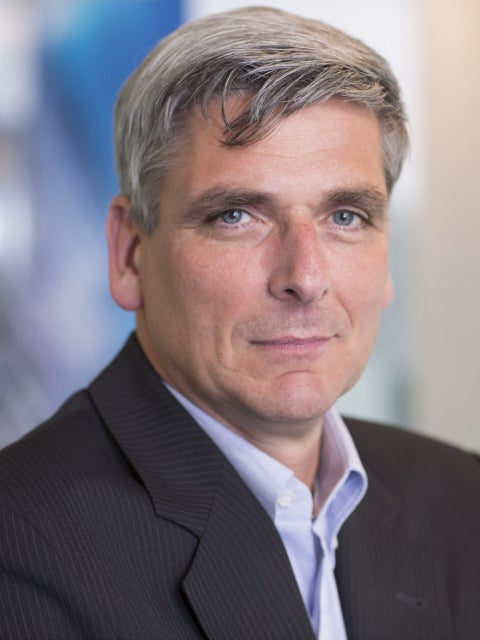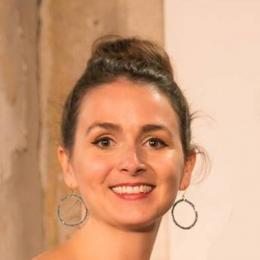
Robert Roelofs
Senior Vice President Legal, General Counsel, and Secretary (Retired)
ASML Holding NV
Eindhoven, North Brabant, Netherlands
For more than 23 years, Robert Roelofs led the legal team at ASML Holding NV. He began as general counsel at the world’s leading semiconductor supplier, and recently stepped down as senior vice president legal, general counsel, and secretary.
While that much time in one position might wear out most people, Roelofs saw opportunities. “Normally, if you tend to stay long in the same role, then you get bored. But not at this company,” he shares in a recent Zoom interview. “Particularly given the growth [at ASML], there were always new challenges around the corner.”
In fact, that’s how his career at ASML began. When he was general counsel at another company, he got a call about an opportunity at ASML, a technology startup from Philips, a Dutch multinational conglomerate and tech giant. He was intrigued: “ASML was seen as a bit of a wild, high-tech environment. But from the first encounter on, I immediately felt at home at this vibrant startup, where the motto was: ‘Do first, tell your boss later.’"
That 2,000-person startup has amassed 28,000 employees and a revenue of €14 billion as of this writing. For his first couple of years at ASML, he was the company’s only lawyer. As the business steadily grew, the law department did as well; it now has 35 lawyers.
But more important than quantity is quality. During Roelofs’ tenure, he built a legal team that is “nicely connected to the business narrative and the board.” This understanding of the business has made the team critical to daily operations, not just limited to negotiating contracts. Rather than being seen as the dreaded department of “no,” his department is appreciated and respected by their non-lawyer colleagues, he beams.
International risks
At first, the legal team’s top issue was drafting commercial contracts for suppliers and customers and making sure that as a newly dual listed company, so that the company was compliant with the US and Dutch listing rules. But the scope for the legal team expanded over the years as ASML acquired more subsidiaries, branched out internationally, and worked with high-profile clients. It also attracted attention from foreign governments and media.
In the early 2000s, ASML’s first major M&A transaction in the United States took an unexpected turn: The US government considered the acquisition a matter of national security. US senators rallied against the transaction, and The Wall Street Journal put the quagmire on their cover. Stunned, but with support from US counsel, Roelofs led his small legal team to overcome that hurdle. “We kept our heads cool, followed the process, and, in the end, struck a deal with CIFIUS to acquire the company,” he recounts. The experience proved valuable for future encounters with the United States and other governments.
ASML had an international component early on, working with companies in the United States, Korea, Taiwan, and China. To expand his legal knowledge, he connected with lawyers who possessed global industry experience. His fellow ACC members have helped him learn about legal issues that arise from working with US and Asia-Pacific companies. He has also networked with counsel from Dutch semiconductor companies.
The pandemic challenged several corporations, which struggled with shifting sales and work process online, supply chain disruption, and sick employees (including ASML’s staff). But as much of the global workforce began working from home, the demand for computers – and thereby semiconductors – skyrocketed. ASML has since seen an increase in sales. They’re not likely to peter out soon, as many companies have adopted hybrid work environments.
Charting the course
Roelofs’ interest in international business began watching his father working as a director at Smit, a Rotterdam tugboat and salvaging company. Early in his law school matriculation at Utrecht University, he knew that he wanted to focus on business. This goal path became more evident after realizing he didn’t want to work in the “parallel world” of law firms.
Instead, as an in-house counsel, he could have more opportunities to work with the business and his non legal colleagues – both rarities at firms. He knew early in his career he wanted to be general counsel of a top company. “Funny enough, that happened,” he muses.
Learn about the ACC CLO Club, a global network for the highest-ranking legal officer.
Of course, he didn’t assume that role immediately after graduation. After finishing law school in a tough job market, he started as a junior in-house counsel at Redland, a Dutch holding company subsidizing a British building material manufacturing group. There, he learned about M&A, preparing him for his next role as senior legal counsel at Alcoa, a major producer of aluminum.
As their only lawyer, he was a critical player as the company acquired businesses after the fall of the Iron Curtain in the late 80s. Several state-owned enterprises in Hungary were for sale, including an aluminum company. Working on cases in post-communist Hungary was a “really a big adventure and then a great experience,” he says. “There was no corporate law to guide us. The law was being written as we proceeded with the transaction.”
Succession planning
When selecting attorneys to mentor, he looks for those interested in compliance and business development. Business-minded lawyers especially stand out, as their collaboration with other teams can drive the company forward. In turn, the soft skills these lawyers acquire make them more in demand, pushing their careers forward.
Succession planning is also a delicate balance. If you tap a rising star who’s ready to move into the role, then “you get an immediate [sense] of pressure,” to retire, Roelofs explains. But if you slate someone who has less experience, you’ll have to wait longer to help them transition. Ultimately, Roelofs and his team hired his successor externally. And since he had that role for over two decades, they wanted a fresh perspective, so he stepped back from the hiring process.
Quasi-retirement
Roelofs’ retirement wasn’t the grand send-off he had envisioned. COVID, the biggest party crasher in recent history, forced him to have one-on-ones with colleagues and mentors. His farewell lesson to in-house lawyers? Know what pays your salary. He continues: “Where does the money come from? How is it earned? The better you understand the business process of the company, the better you can align your legal advice with that business.”
Start by understanding your business, he advises, even if it’s a concept as complex as silicon chips. Usually, the product experts will be thrilled to explain the ins-and-outs.
Now that he has left the “high complexity, high speed” environment at ASML, he hopes to unwind a bit in southern France, where he bought a house near St. Tropez. He still plans to have a professional life — albeit at a limited capacity — maybe in an advising role or as a board member at a technology company. “Preferably a startup,” he says.
Getting to know… Robert Roelofs
What’s the best piece of career advice you’ve learned?
Don't start talking if you have no idea what you're talking about. For example, ASML has highly skilled engineers, and they can immediately see through that. We had a few lawyers there who joined, then tried to sound like experts, but weren’t really. They were quickly brushed off. If you don't know what you're talking about, don't talk, but do make sure that you understand the next time.
Now that you’ve retired, you have more time to destress. When you were working at ASML, what would keep you up at night?
The risk that we were going to be hit by some major compliance related problem. As the company has grown so fast over the years, totally focused on its technology, there’s always a risk that we missed out on something. Luckily that hasn't happened and over the past years ASML has put major efforts in further improving its overall compliance program.
Did you pick up any new hobbies during the pandemic? Are there any others you’d like to pursue during your retirement?
I was already a bit of a petrolhead (restoring classic cars) and that has only gotten worse during the pandemic 😊 I also started taking French language lessons to prepare me for my early morning coffee at the local squares in Provence.




